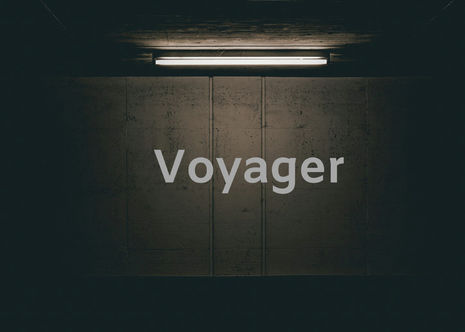Voyager: The twisty darkness of the female mind at the end of the world
Helena Coggan invites the audience into the intense, disorientating world of her new play

First of all, what do you want people to know about Voyager?
It’s a locked-room drama, quite literally, about the inside of a government office during a disease outbreak. The idea is that you, the audience member, are sitting inside of this office and watching meetings and arguments and interrogations and listening to vague snippets of information from the world outside as the power flickers on and off above your head and everything collapses unseen in the world outside. It’s one night, it’s in the Larkum, there are thirty seats in the room. It’s going to be an intense experience.
How do you feel about entering the Cambridge theatre scene as a new writer and director?
Oh, there’s a lot attached to this question. I will give the standard answer, which is true, if incomplete: I am excited, I feel full of purpose, I am having the time of my life. Everyone has been lovely to me, and I’ve met some great people.
On the other hand it’s also been very disorienting. I’m a third-year physics student and realistically I couldn’t have gotten involved in theatre before this year- in the first couple of years of a natsci degree you have an extremely structured, three-deadlines-a-week lifestyle that doesn’t allow for multi-day commitments like rehearsals, or at least not without everything catching fire around you. In many ways it feels like I’m a fresher again. Everyone knows everyone else, everyone has friendships and grudges stretching back years. But everyone is also very kind, and willing to show me where the printers and the chairs are. I’ve met some of the most terrifyingly competent people I have ever encountered in my life. Some of these people are going to be in the Cabinet in 20 years, or running the National Theatre, or something. Anyone who wishes to take bets on individual names should get in touch.
I believe, though I do not want to, that we’ve already passed the point where this world is inevitable.
How would you say that your writing has been influenced by the current global situation?
It depends what you mean by that. It was written in September, before the coronavirus outbreak, so in that sense not at all. But it’s also about a slide into authoritarianism- not in a widescale political or societal sense but on a personal level, about the circumstances and the thought process that leads one woman under enormous pressure to resort to acts of brutality. I wanted to depict and understand that without condoning it; I think it’s a useful process to give thought to right now. And it’s also a play about climate change and technological breakdown and misinformation, which very much reflects a worldview that has embedded itself quietly within me in the last few years: that the world of the mid-2020s will look as it does in this play, everything broken and uncertain and precarious. I believe, though I do not want to, that we’ve already passed the point where this world is inevitable.
Your two main characters are very different in terms of their reactions to the crisis. Do you think either of them are ‘right’?
Without wishing to spoil anything, one of the characters reacts to the prospect of a national disease outbreak with panic and energy, and a sense of righteous purpose that eventually carries her into violence- and the other reacts with shame and solemn horror and the desire to suppress whatever information she knows. I do not take- and I’m aware that this may come across as cowardly NYT op-ed both-sides bullshit- any position on who is right. The play itself doesn’t, because whatever the audience thinks about the story, they’re going to think about it, and trying to drag them one way or the other will be heavy-handed and ineffective. And I don’t, personally, because I think coming to one opinion or the other will skew how I direct the play, so I will consider it further when I’m done working on it.
Following up on that, you’ve also written two female characters at the centre of your play - do you think this influenced the way in which their characters develop?
Absolutely it does. I’ve thought a lot about this, and when casting this play I was open to gender-blindness up to a point, because the play is about power dynamics and violence and the terrifying authoritarian state, and so it is absolutely significant that in, say, all the interrogation scenes, everyone involved is female/NB. If we had changed that in casting then it would have screwed up a lot of the dialogue and the emotional timbre of the scenes. The person being interrogated is a twenty-year-old woman, and if she were being questioned by a man, alone in a darkened room, the spectre of various kinds of violence would loom much larger than they do and alter how everything was heard and spoken. The play also deal with the particular kinds of trust that can exist between women- between sisters, between stepmother and stepdaughter, between female colleagues- and the way in which that can be twisted and misused to create a sense of similarity that doesn’t exist.
Voyage is on at the Larkum Studio on 20th February.
 Comment / Plastic pubs: the problem with Cambridge alehouses 5 January 2026
Comment / Plastic pubs: the problem with Cambridge alehouses 5 January 2026 News / News in Brief: Postgrad accom, prestigious prizes, and public support for policies11 January 2026
News / News in Brief: Postgrad accom, prestigious prizes, and public support for policies11 January 2026 Theatre / Camdram publicity needs aquickcamfab11 January 2026
Theatre / Camdram publicity needs aquickcamfab11 January 2026 News / Cambridge academic condemns US operation against Maduro as ‘clearly internationally unlawful’10 January 2026
News / Cambridge academic condemns US operation against Maduro as ‘clearly internationally unlawful’10 January 2026 Comment / Will the town and gown divide ever truly be resolved?12 January 2026
Comment / Will the town and gown divide ever truly be resolved?12 January 2026









